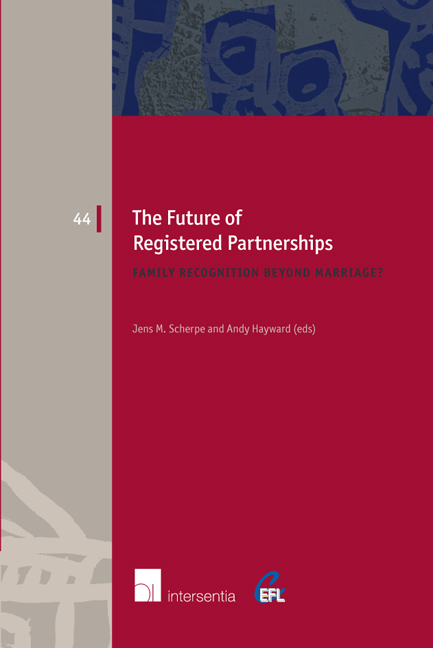Book contents
- Frontmatter
- Foreword
- Preface
- Contents
- List of Contributors
- The Future of Registered Partnerships: An Introduction
- Questionnaire
- Part I Registered Partnerships as a Functional Equivalent to Marriage
- Part II Registered Partnerships as an Alternative to Marriage
- Part III Registered Partnerships in a Time of Transition
- Part IV Alternative Models for Registered Partnerships: Beyond Conjugality, Beyond Formality
- Registered Partnerships in Spain
- Registered Partnerships in Belgium
- Registered Partnerships in Australia
- Registered Partnerships in New Zealand
- Part V Registered Partnerships, Discrimination and Human Rights
- Part VI Comparative Perspective and Conclusions
- Index
- European Family Law Series
Registered Partnerships in New Zealand
from Part IV - Alternative Models for Registered Partnerships: Beyond Conjugality, Beyond Formality
Published online by Cambridge University Press: 22 September 2018
- Frontmatter
- Foreword
- Preface
- Contents
- List of Contributors
- The Future of Registered Partnerships: An Introduction
- Questionnaire
- Part I Registered Partnerships as a Functional Equivalent to Marriage
- Part II Registered Partnerships as an Alternative to Marriage
- Part III Registered Partnerships in a Time of Transition
- Part IV Alternative Models for Registered Partnerships: Beyond Conjugality, Beyond Formality
- Registered Partnerships in Spain
- Registered Partnerships in Belgium
- Registered Partnerships in Australia
- Registered Partnerships in New Zealand
- Part V Registered Partnerships, Discrimination and Human Rights
- Part VI Comparative Perspective and Conclusions
- Index
- European Family Law Series
Summary
HISTORY AND BACKGROUND
BASIC STRUCTURES OF THE LAW ON ADULT RELATIONSHIPS
New Zealand law recognises three forms of adult relationships: marriage, registered partnership (referred to in New Zealand as ‘civil union’), and unregistered cohabitation (referred to in New Zealand as ‘ de facto relationships’).
Marriage is governed by the Marriage Act 1955. In 2013 the principal Act was amended to recognise marriage equality, and section 2(1) now provides that ‘a marriage is between 2 people regardless of their sex, sexual orientation or gender identity.’ The Civil Union Act 2004 enables different-sex and samesex couples to register a civil union. The option of entering into a civil union continues to be available notwithstanding the recognition of marriage equality in 2013. Unregistered cohabitants, whether different-sex or same-sex, are also treated the same as married couples and civil union partners for many legal purposes. In 2001 the Property (Relationships) Act 1976 was extended to cover couples in de facto relationships of three or more years'duration. At the same time, a number of existing laws were also amended to give de facto partners the same rights as spouses.
Despite recognising a very wide range of ‘conjugal’ relationships, New Zealand does not recognise other forms of ‘domestic’ relationships such as those between family members, carers or platonic home sharers.
MOTIVES FOR INTRODUCTION OF REGISTERED PARTNERSHIP
History
The legislative appetite for the acceptance of civil union as a legally recognised form of conjugal partnership developed gradually over a number of years. Several milestones foreshadowed the Civil Union Act 2004.
Section 19 of the New Zealand Bill of Rights Act 1990 (as amended by the Human Rights Act 1993) provides that everyone has the right to freedom from discrimination on the grounds stated in the Human Rights Act, with discrimination on the basis of sexual orientation being one such ground. The Bill of Rights Act was tested in the late 1990s in Quilter v. Attorney-General, 5 where three lesbian couples were refused marriage licences. The plaintiffs argued that the Marriage Act 1955 (which at that time did not define marriage) ought to be interpreted consistently with the Bill of Rights Act, thereby allowing same-sex couples to marry.
- Type
- Chapter
- Information
- The Future of Registered PartnershipsFamily Recognition Beyond Marriage?, pp. 439 - 468Publisher: IntersentiaPrint publication year: 2017



